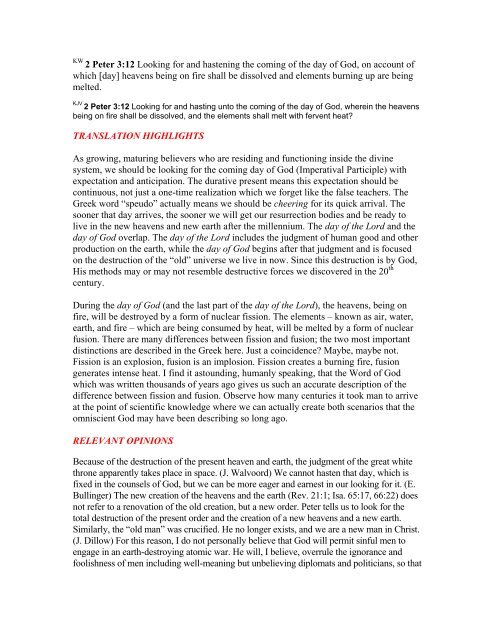2 Peter - Verse-by-Verse Biblical Exegesis
2 Peter - Verse-by-Verse Biblical Exegesis
2 Peter - Verse-by-Verse Biblical Exegesis
Create successful ePaper yourself
Turn your PDF publications into a flip-book with our unique Google optimized e-Paper software.
KW 2 <strong>Peter</strong> 3:12 Looking for and hastening the coming of the day of God, on account of<br />
which [day] heavens being on fire shall be dissolved and elements burning up are being<br />
melted.<br />
KJV 2 <strong>Peter</strong> 3:12 Looking for and hasting unto the coming of the day of God, wherein the heavens<br />
being on fire shall be dissolved, and the elements shall melt with fervent heat?<br />
TRANSLATION HIGHLIGHTS<br />
As growing, maturing believers who are residing and functioning inside the divine<br />
system, we should be looking for the coming day of God (Imperatival Participle) with<br />
expectation and anticipation. The durative present means this expectation should be<br />
continuous, not just a one-time realization which we forget like the false teachers. The<br />
Greek word “speudo” actually means we should be cheering for its quick arrival. The<br />
sooner that day arrives, the sooner we will get our resurrection bodies and be ready to<br />
live in the new heavens and new earth after the millennium. The day of the Lord and the<br />
day of God overlap. The day of the Lord includes the judgment of human good and other<br />
production on the earth, while the day of God begins after that judgment and is focused<br />
on the destruction of the “old” universe we live in now. Since this destruction is <strong>by</strong> God,<br />
His methods may or may not resemble destructive forces we discovered in the 20 th<br />
century.<br />
During the day of God (and the last part of the day of the Lord), the heavens, being on<br />
fire, will be destroyed <strong>by</strong> a form of nuclear fission. The elements – known as air, water,<br />
earth, and fire – which are being consumed <strong>by</strong> heat, will be melted <strong>by</strong> a form of nuclear<br />
fusion. There are many differences between fission and fusion; the two most important<br />
distinctions are described in the Greek here. Just a coincidence? Maybe, maybe not.<br />
Fission is an explosion, fusion is an implosion. Fission creates a burning fire, fusion<br />
generates intense heat. I find it astounding, humanly speaking, that the Word of God<br />
which was written thousands of years ago gives us such an accurate description of the<br />
difference between fission and fusion. Observe how many centuries it took man to arrive<br />
at the point of scientific knowledge where we can actually create both scenarios that the<br />
omniscient God may have been describing so long ago.<br />
RELEVANT OPINIONS<br />
Because of the destruction of the present heaven and earth, the judgment of the great white<br />
throne apparently takes place in space. (J. Walvoord) We cannot hasten that day, which is<br />
fixed in the counsels of God, but we can be more eager and earnest in our looking for it. (E.<br />
Bullinger) The new creation of the heavens and the earth (Rev. 21:1; Isa. 65:17, 66:22) does<br />
not refer to a renovation of the old creation, but a new order. <strong>Peter</strong> tells us to look for the<br />
total destruction of the present order and the creation of a new heavens and a new earth.<br />
Similarly, the “old man” was crucified. He no longer exists, and we are a new man in Christ.<br />
(J. Dillow) For this reason, I do not personally believe that God will permit sinful men to<br />
engage in an earth-destroying atomic war. He will, I believe, overrule the ignorance and<br />
foolishness of men including well-meaning but unbelieving diplomats and politicians, so that









